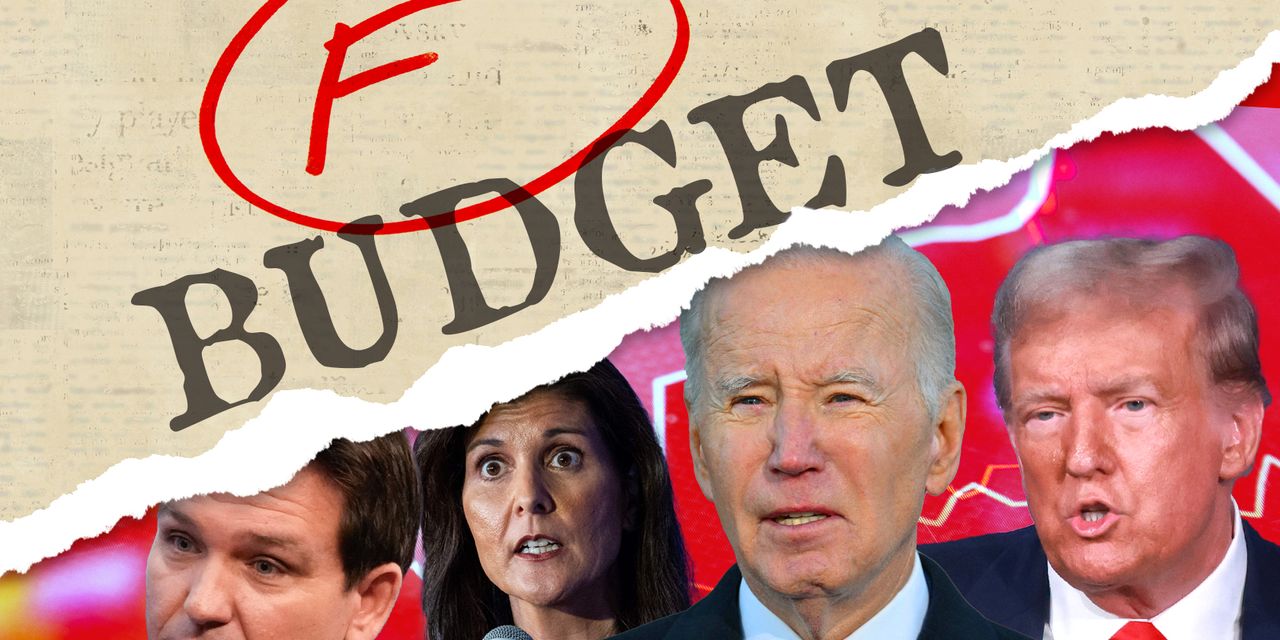“ Surging U.S. budget deficits have already contributed to rising inflation and a tripling of interest rates.”
At the third Republican presidential debate on November 8th, U.S. voters will likely hear a deluge of insults, interruptions, canned jokes and empty talking points.
They will not likely hear any coherent solution to the soaring budget deficits that are driving Washington towards a fiscal crisis.
The federal government recently revealed that the budget deficit for 2023 doubled to a staggering $2 trillion (adjusted for the cancelled student loan bailout). At 7.7% of GDP, 2023 marked the largest budget deficit in American history outside of temporary emergencies such as wars, recessions, and pandemics. These deficits are projected to surpass $3 trillion within a decade and continue growing thereafter.
These surging U.S. budget deficits have already contributed to rising inflation and a tripling of interest rates. The combination of rising debt and interest rates has quickly doubled Washington’s interest costs to $659 billion. Within a decade, interest costs on the national debt could approach $2 trillion annually, consuming 30% of all federal taxes.
The long-term picture is even more dire. The Congressional Budget Office projects that over the next three decades, Social Security and Medicare will run a staggering shortfall of $116 trillion, driving the national debt to nearly twice the size of the economy. All that borrowing will make interest the largest federal expenditure, consuming the majority of taxes. The debt is so unsustainable that, when economists at the University of Pennsylvania tried to model the long-term economy under these baseline-projected budget deficits, their model crashed.
A consensus of economists agrees that Washington risks a debt crisis at some point unless lawmakers make the difficult decisions to both raise taxes and pare back spending. Everything must be on the table, including middle-class taxes as well as the escalating Social Security and Medicare shortfalls driving the deficits. Cutting waste, welfare, defense and foreign aid is not close to enough. Nor can taxing the rich or uncapping the Social Security payroll tax close more than a small fraction of the budget gap.
What solutions have the 2024 U.S. presidential candidates offered to these unsustainable budget deficits? None. In fact, their proposals would add even more red ink.
Former President Donald Trump is once again promising new tax cuts and no changes to the Social Security and Medicare systems that are projected to be insolvent within a decade. Florida Governor Ron DeSantis has also seemingly taken Social Security and Medicare off the table, pairing more tax cuts with lazy pledges to cut “waste, fraud, and abuse.” U.S. Senator Tim Scott’s deficit reduction plan would actually expand budget deficits. And former South Carolina Governor Nikki Haley, the most fiscally conservative GOP candidate, would pair large new tax cuts with Social Security reforms that wouldn’t take place until around 2050 — or 17 years after the fund has run insolvent, according to the system’s trustees.
Perhaps most absurdly, Vivek Ramaswamy claims his economic plan would unleash such an unprecedented burst of economic growth and tax revenues that the budget deficit would simply vanish. Such a pledge not only assumes a tripling of the economy’s productivity rate, it also forgets that such rapid economic and wage growth would further push up Social Security and Medicare costs as well as interest rates on the federal debt, negating much of the deficit reduction.
On the Democratic side, President Joe Biden has pledged no reforms to Social Security and Medicare, no tax increases for families earning under $400,000, and a budget proposal that would both extend most of the 2017 tax cuts and pile on $2 trillion in spending hikes.
“Presidential campaigns have not always been so irresponsible on deficits.”
Contrary to popular belief, presidential campaigns have not always been so irresponsible on deficits. In the 1980s, candidates regularly promised deficit reduction, and in 1992 both Democratic nominee Bill Clinton and independent candidate Ross Perot ran explicitly on deficit-reduction plans. Continuing through 2012, presidential nominees of both major parties generally produced budget blueprints (of varying detail) showing how to offset the cost of their new initiatives (the main exception being in 2000, when candidates debated how to spend a 10-year projected surplus of $5 trillion that ultimately never materialized).
Of course, most U.S. presidents still expanded deficits, but by amounts substantially less than Trump and Biden, who explicitly ran on budget-busting policies. Trump signed legislation that cumulatively added $7.8 trillion to 10-year deficits, while Biden managed to enact $4.8 trillion in new deficit initiatives in just his first 20 months (with trillions more in proposed new spending blocked by Congress).
“Washington cannot borrow-and-spend what financial markets will not lend.”
While pandering to voters with tax cuts and spending expansions is easy and popular, these candidate promises have no basis in economic reality. The national debt held by the public, currently $26 trillion, would likely top $180 trillion within three decades under their proposals. However, financial markets almost certainly lack the capacity to lend Washington this additional $154 trillion over 30 years — at least not at the sub-4% interest rates that would be required to avoid a debt and interest rate spiral. Washington cannot borrow-and-spend what financial markets will not lend.
Eventually the math and economics always win out, and Washington will have to pare back its unsustainable debt. Delay only makes the inevitable reforms more drastic and painful. While vague promises to rein in deficits are commonplace, don’t expect the presidential candidates at this next debate to offer any serious solutions.
Brian Riedl is a senior fellow at the Manhattan Institute. Follow him on X @Brian_Riedl.
More: Haley looks like top challenger to Trump ahead of latest GOP debate, with a Social Security plan that’s ‘differentiating’ her
Plus: New poll shows Trump leading Biden in 5 key battleground states
Read the full article here







